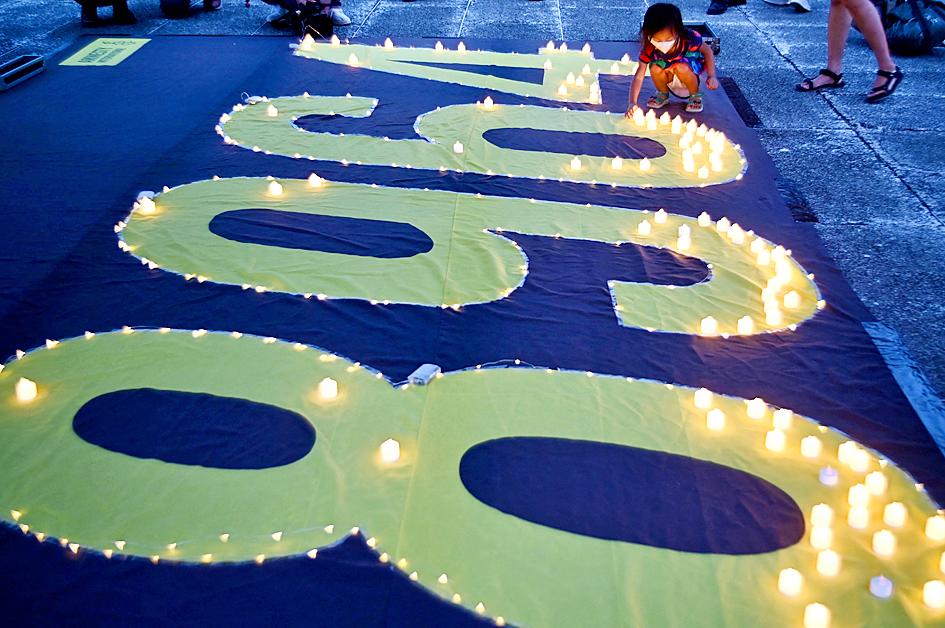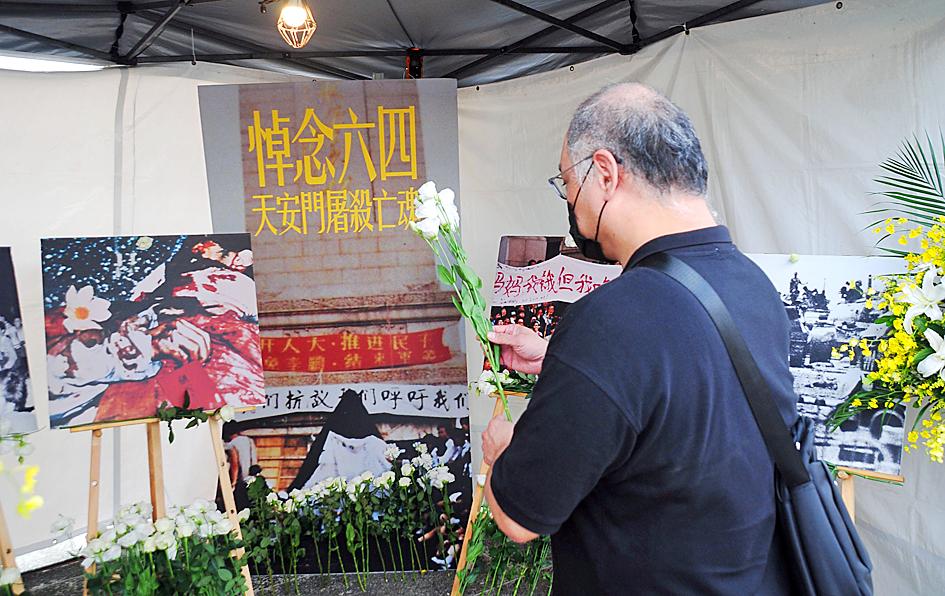Hong Kong is systematically removing reminders of the Tiananmen Square Massacre, President Tsai Ing-wen (蔡英文) said yesterday, the 33rd anniversary of the incident.
Authorities in Hong Kong, where people had held annual candlelight vigils at Victoria Park on the massacre’s anniversary for many years, had not received an application for such an event this year, she said on Facebook.
Statues commemorating the massacre, among other expressions of support for democracy, have been removed from university campuses in the territory without an explanation from authorities, Tsai said.

Photo: Sam Yeh, AFP
“The collective memory of the Tiananmen Square Massacre is being systematically removed in Hong Kong,” she said, adding that such brutish methods would not eradicate people’s memories of the incident.
Increasing threats from authoritarian countries against democracies highlight the necessity of upholding democratic values and enhancing collaborations with like-minded international partners, Tsai said.
As authoritarianism is increasingly threatening democracy worldwide, Taiwan and other like-minded democracies must reinforce joint efforts to uphold democratic values, Tsai said, citing as examples of collaboration Japan’s donation of 1.24 million COVID-19 vaccine doses last year, as well as vaccine sharing between the US and its European allies.

Photo: CNA
We must cherish our democratic freedoms, but at the same time should be cautious when exercising our right to free speech, Tsai said.
Disinformation about COVID-19 might cause social unrest and place a heavy burden on medical personnel, Tsai said, referring to a controversy last month when TV celebrity Anthony Kuo (郭彥均) posted a screenshot on Facebook that he originally said represented a conversation with a medical professional who said that “many children passed away” from the virus in Taiwan.
The government denied that the alleged statement by a doctor represented the truth, causing a large number of people to say that Taiwan is trying to limit freedom of speech.
Tsai said she believes in transparency of information, adding that every member of the public is entitled to voice their opinion.
She said she believes that a diversity of opinions benefits society and that communication can help mitigate conflicts.
Taiwan’s widely praised COVID-19 pandemic response is the result of civilian oversight, while authoritarian governments undemocratic efforts to limit pandemic information might lead to the pandemic getting worse, she said.

MAKING WAVES: China’s maritime militia could become a nontraditional threat in war, clogging up shipping lanes to prevent US or Japanese intervention, a report said About 1,900 Chinese ships flying flags of convenience and fishing vessels that participated in China’s military exercises around Taiwan last month and in January last year have been listed for monitoring, Coast Guard Administration (CGA) Deputy Director-General Hsieh Ching-chin (謝慶欽) said yesterday. Following amendments to the Commercial Port Act (商港法) and the Law of Ships (船舶法) last month, the CGA can designate possible berthing areas or deny ports of call for vessels suspected of loitering around areas where undersea cables can be accessed, Oceans Affairs Council Minister Kuan Bi-ling (管碧玲) said. The list of suspected ships, originally 300, had risen to about

DAREDEVIL: Honnold said it had always been a dream of his to climb Taipei 101, while a Netflix producer said the skyscraper was ‘a real icon of this country’ US climber Alex Honnold yesterday took on Taiwan’s tallest building, becoming the first person to scale Taipei 101 without a rope, harness or safety net. Hundreds of spectators gathered at the base of the 101-story skyscraper to watch Honnold, 40, embark on his daredevil feat, which was also broadcast live on Netflix. Dressed in a red T-shirt and yellow custom-made climbing shoes, Honnold swiftly moved up the southeast face of the glass and steel building. At one point, he stepped onto a platform midway up to wave down at fans and onlookers who were taking photos. People watching from inside

Japan’s strategic alliance with the US would collapse if Tokyo were to turn away from a conflict in Taiwan, Japanese Prime Minister Sanae Takaichi said yesterday, but distanced herself from previous comments that suggested a possible military response in such an event. Takaichi expressed her latest views on a nationally broadcast TV program late on Monday, where an opposition party leader criticized her for igniting tensions with China with the earlier remarks. Ties between Japan and China have sunk to the worst level in years after Takaichi said in November that a hypothetical Chinese attack on Taiwan could bring about a Japanese

The WHO ignored early COVID-19 warnings from Taiwan, US Deputy Secretary of Health and Human Services Jim O’Neill said on Friday, as part of justification for Washington withdrawing from the global health body. US Secretary of State Marco Rubio on Thursday said that the US was pulling out of the UN agency, as it failed to fulfill its responsibilities during the COVID-19 pandemic. The WHO “ignored early COVID warnings from Taiwan in 2019 by pretending Taiwan did not exist, O’Neill wrote on X on Friday, Taiwan time. “It ignored rigorous science and promoted lockdowns.” The US will “continue international coordination on infectious